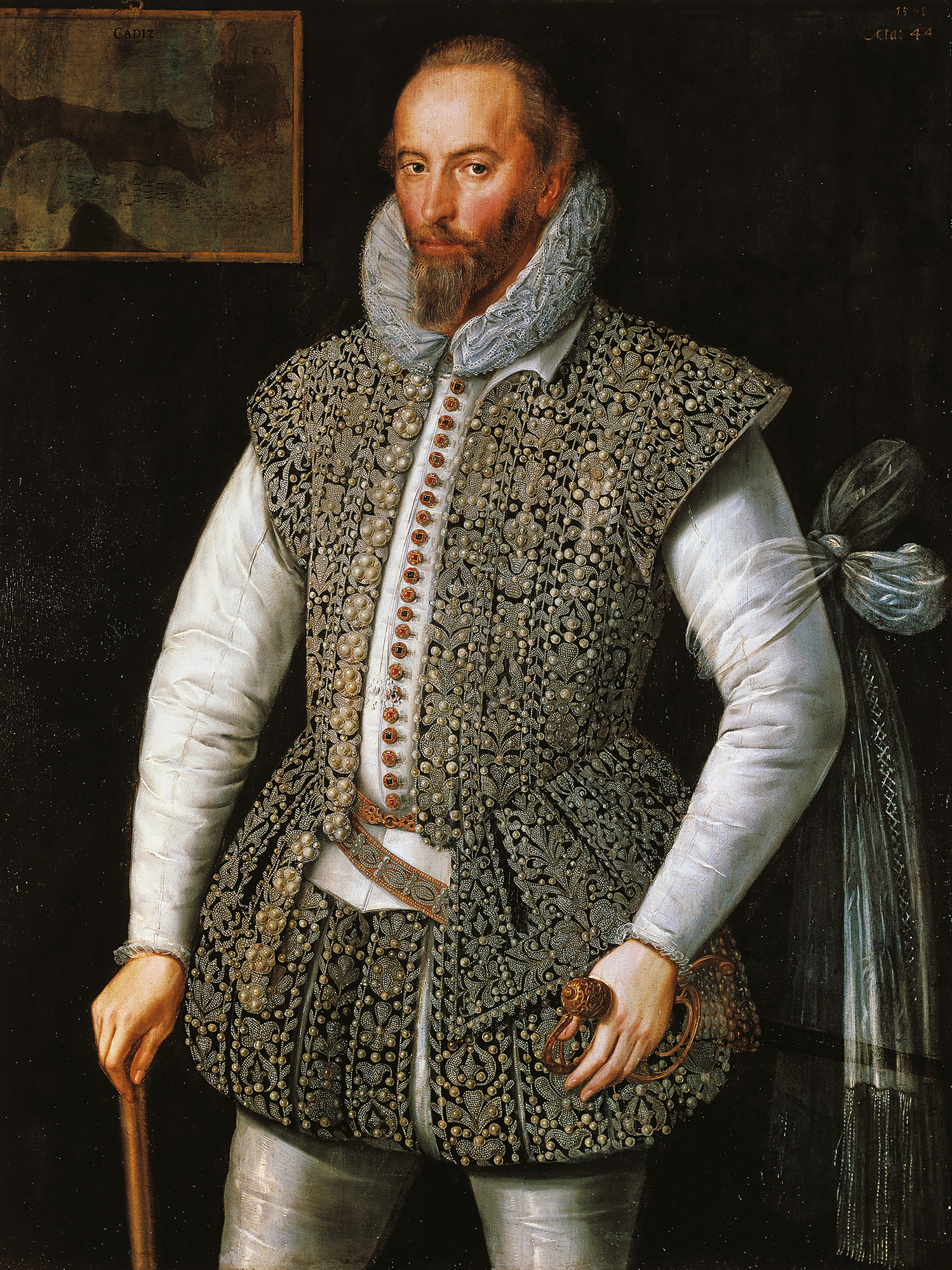Raleigh, << RAW lee or RAH lee, >> Sir Walter (1552?-1618), is one of the most colorful figures in English history. He was a soldier, explorer, writer, and businessman. He spelled his last name Ralegh.

Raleigh was born at Hayes Barton, a family home in Devonshire, and attended Oxford University. He left school before graduating to join a band of gentlemen volunteers who were helping the Huguenots in France. In 1578, he returned to England and joined his half brother, Sir Humphrey Gilbert , on a voyage of discovery and piracy.
Raleigh and Elizabeth I.
In 1580, Raleigh became a captain in the army in Ireland. There he distinguished himself by his ruthlessness at the siege of Smerwick. The next year, he went to Queen Elizabeth’s court with dispatches. There is a famous story about his meeting with Elizabeth. The queen was out walking, and stopped before a large mud puddle. Raleigh removed his coat and placed it over the puddle for her to walk on. It is doubtful that this story is true. But Raleigh did become the queen’s favorite. She granted him an estate of 12,000 acres (4,860 hectares) in Ireland. She also gave him trade privileges and the right to colonize in America. In 1585, she made him a knight.
His expeditions.
Raleigh became deeply interested in exploration, like many prominent English people of his day. He sent several expeditions to America, and spent a fortune trying to establish an English colony there. His settlers landed in what is now the state of North Carolina and explored the coast as far as present-day Florida. Raleigh and Elizabeth, who was known as “The Virgin Queen,” named much of what is now the Eastern United States Virginia, in honor of the queen.
Raleigh’s first colonizing expedition left Plymouth in April 1585. It established a colony on Roanoke Island in Pamlico Sound. But sickness and fear caused the survivors of this first English colony in North America to go home with Sir Francis Drake in 1586.
In 1587, Raleigh sent a second expedition. A group of 117 colonists, including 17 women, landed on Roanoke Island. On Aug. 18, 1587, the first English child was born in North America (see Dare, Virginia ). John White , the governor, went back to England for supplies. He was delayed by war with Spain, and when he returned to Roanoke in 1590, the settlers had mysteriously disappeared (see Lost Colony ).
Raleigh also took part in the victory over the Spanish Armada in 1588. He led other expeditions against Spanish possessions and returned with much booty. During the 1590’s, his power reached its height, and he had much influence and many enemies. Raleigh, who was also a poet, obtained a pension for the English poet Edmund Spenser and helped Spenser publish The Faerie Queene . Raleigh also helped introduce the potato plant and tobacco use to Ireland.
His fall.
Raleigh lost the queen’s favor by marrying one of her attendants. Hoping to recover his position and the money he had spent, he led an expedition to Guiana, in South America, to search for El Dorado , a legendary land of gold. However, the expedition failed.
Elizabeth died in 1603, and the new king, James I , distrusted and feared Raleigh. He charged Raleigh with treason and imprisoned him in the Tower of London . There Raleigh lived comfortably for 12 years with his family and servants, and wrote his History of the World. He was released in 1616 to lead an expedition to search for gold in South America. The king ordered him not to invade Spanish territory. But Raleigh’s men attacked the Spaniards. Raleigh’s son Wat was killed in the attack, and Raleigh was forced to abandon the project.
Upon his return to England, he was sentenced to death for disobeying orders. Raleigh met his fate bravely. He joked with the executioner and even gave the signal for the ax to fall. He was executed in London on Oct. 29, 1618.
